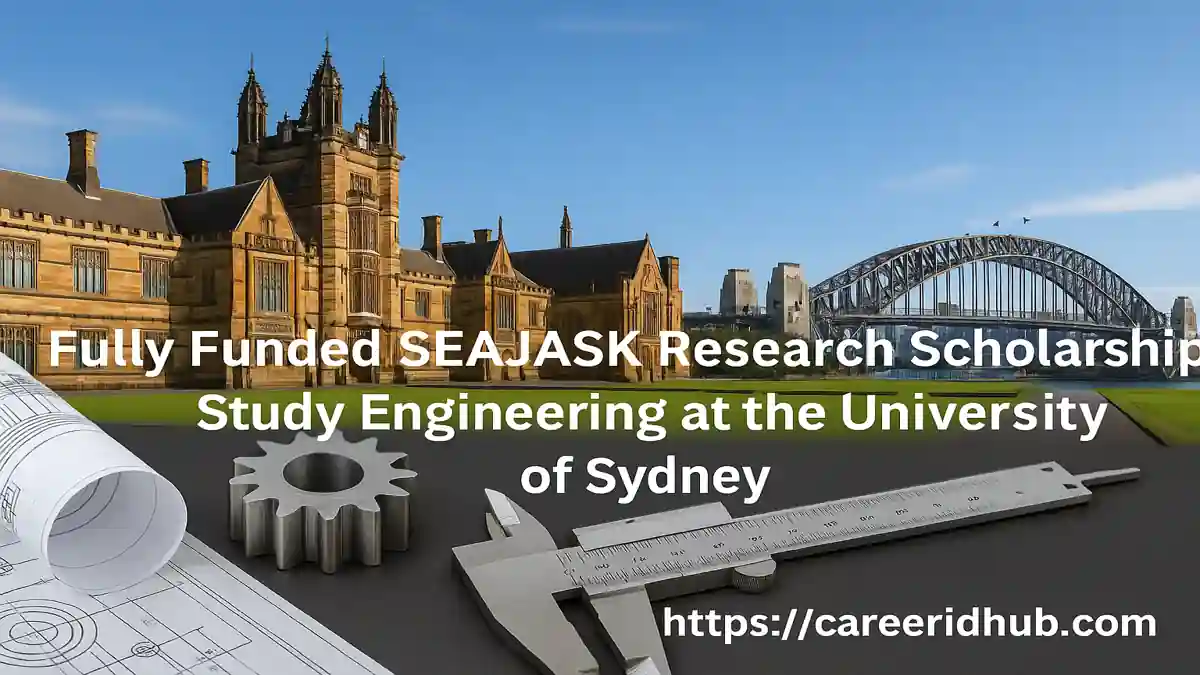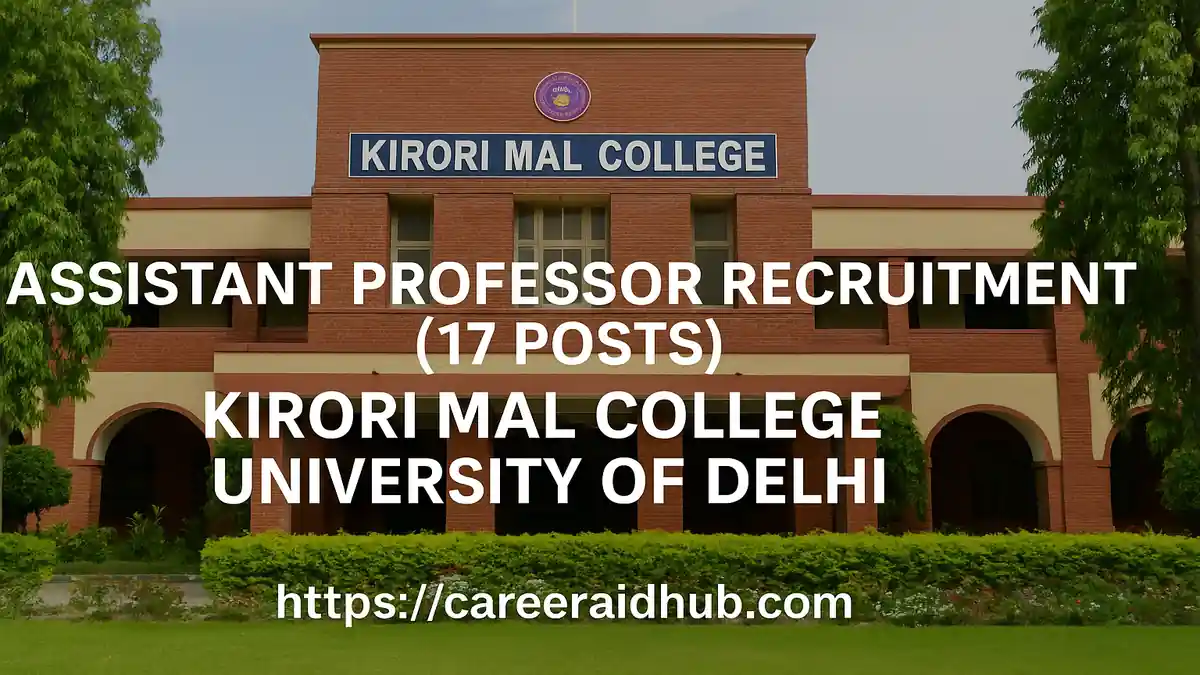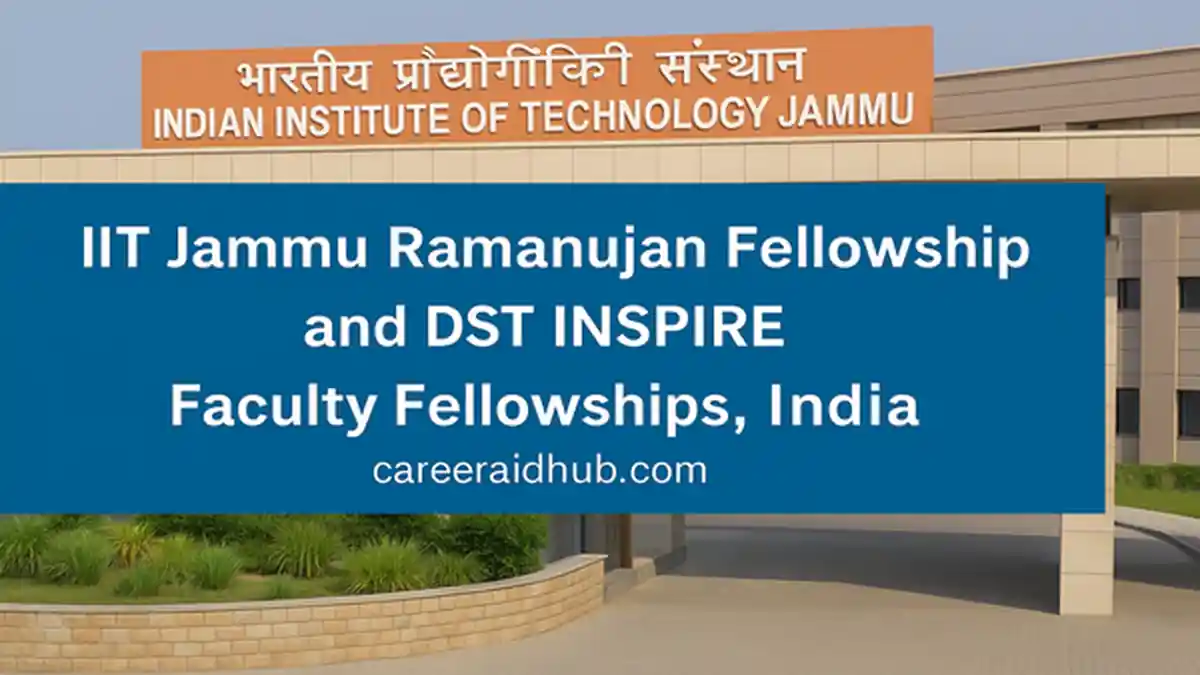SEAJASK Research Scholarship: Australia
In today’s globally connected academic landscape, fully funded international PhD programs are more than financial aid—they are gateways to high-impact research and international collaboration. Among such opportunities, the Faculty of Engineering Research SEAJASK Scholarship offered by the University of Sydney stands as a distinguished path for exceptional candidates from Southeast Asia, Japan, and South Korea.
This scholarship paves the way for candidates to earn a PhD from one of Australia’s most research-intensive faculties. With comprehensive financial support covering tuition, a competitive stipend, and relocation assistance, the SEAJASK program is ideally suited for recent graduates and emerging researchers aspiring to advance their careers in engineering and technology.
This detailed guide covers everything applicants need to know—including eligibility, application steps, benefits, deadlines, and areas of research—to successfully pursue this competitive award.
Citation: University of Sydney – Faculty of Engineering SEAJASK Research Scholarship
About the SEAJASK Research Scholarship
Program Name: Faculty of Engineering Research SEAJASK Scholarship
Current Status: The scholarship is currently active and open for rolling applications.
Overview & Objectives
The SEAJASK Research Scholarship is structured to nurture outstanding PhD candidates from Japan, South Korea, and ASEAN countries. Its mission is to foster diversity, regional collaboration, and innovation by supporting promising engineering researchers through advanced, real-world research experiences at the University
Duration :The scholarship supports PhD studies for up to 3.5 years, in line with the university’s standard full-time doctoral timeframe.
Study/Work Mode
-
- Mode: Full-time only
- Location: On-campus, University of Sydney (Australia)
Core Focus Areas
Eligible research areas span across all departments within the Faculty of Engineering, including:
-
- Electrical and Information Engineering
- Civil Engineering
- Mechanical and Mechatronic Engineering
- Biomedical Engineering
- Aerospace and Space Technology
- Renewable Energy Systems
- Robotics and Artificial Intelligence
- Telecommunications and Data Networks
Eligibility Criteria for SEAJASK Research Scholarship
Academic Qualifications
Candidates should possess at least a Bachelor’s degree with honours (First Class or Upper Second Class) or a Master’s degree demonstrating robust research potential.
Professional/Research Experience
Prior research experience is not required but highly valued. Applicants with documented research activities, publications, or academic recognition will have a stronger case.
Age Limit
There is no upper age limit for this scholarship.
Nationality Restrictions
Open to nationals from:
-
- Southeast Asian nations
- Japan
- South Korea
Language Requirements
Applicants must meet the University’s language requirements:
- IELTS Academic: 6.5 overall, with no band lower than 6.0
- TOEFL iBT: Minimum score of 96
- PTE Academic: Minimum score of 68
Other Requirements
- Unconditional offer to pursue a full-time PhD within the Faculty of Engineering
- Valid student visa (or plan to apply)
- Well-structured Statement of Purpose aligning with faculty research goals
Application Process
Step-by-Step Guide
-
- Identify a Supervisor: Begin by finding a suitable academic supervisor from the Faculty of Engineering.
- Apply for PhD Admission: Submit a full PhD application via the university’s admissions portal.
- Prepare Documents: Ensure all supporting documents are submitted with your application.
- Automatic Consideration: Once eligible, no separate application is required for the scholarship.
Required Documents
To support your application, prepare the following:
-
- Curriculum Vitae (CV) – Detailed academic and research record.
- Research Proposal – Clearly structured (1–2 pages) proposal outlining objectives, methodology, and relevance.
- Recommendation Letters – Two references, preferably academic supervisors.
- Academic Transcripts – Certified records from previous degrees.
- Proof of Language Proficiency – IELTS, TOEFL, or PTE results.
- Passport Copy / ID Proof – National identity documentation.
- Personal Statement – Motivation, research goals, and relevance to faculty themes.
Fields of Study / Research Areas Supported
Applicants may propose topics in:
-
- Artificial Intelligence & Machine Learning
- Renewableand Sustainable Energy
- Water and Environmental Infrastructure
- Aerospace Engineering
- Biomedical Technologies
- Smart Cities & Transport Engineering
- Cyber-physical Systems
- Robotics, Sensors, and Embedded Systems
Cross-disciplinary and innovative topics are encouraged and welcomed.
Financial Benefits
Tuition Fees
Covers 100% tuition costs for the duration of the doctoral program.
Monthly Living Allowance
Tax-free stipend set at AUD $35,000/year, in line with Australia’s RTP benchmark.
SSAF Coverage
The Student Services and Amenities Fee (SSAF) is fully funded by the university.
Relocation Support
Eligible students receive airfare reimbursement and financial support to ease transition into Australia.
Additional Perks
-
- Overseas Student Health Cover (OSHC)
- Access to research funding and infrastructure
- University housing assistance
Selection Process
Stages of Evaluation
-
- Submission of complete application
- Internal academic assessment
- Supervisor nomination and confirmation
- Faculty-level and funding approval
Evaluation Criteria
-
- Academic distinction and qualifications
- Strength and originality of proposed research
- Supervisor and faculty alignment
- Contribution to regional diversity (ASEAN, Japan, South Korea)
Notification Timeline
-
- Review timeline: 4–8 weeks post-application
- Outcome notifications: Sent on a rolling basis via email
Important Application Deadlines
-
- Applications Open: Ongoing
- Closing Date: No formal deadline; rolling submissions
- Interview Dates: Based on supervisor discretion
- Final Results: Typically within 1–2 months
- Program Start: Flexible; typically March or July intakes
Tips to Strengthen Your Application
-
- Statement of Purpose: Align your goals clearly with existing research projects at Sydney.
- Engage Early: Contact potential supervisors before applying.
- Academic Achievements: Emphasize distinctions, projects, and relevant publications.
- Review Documents Carefully: Ensure clarity, formatting, and error-free submissions.
- Plan Ahead: Apply at least 2–3 months before your intended intake session.
Contact Information
-
- Official Scholarship Page
- Admissions Information
- Phone: +61 2 9351 2222
- Email: [email protected]
Conclusion
The SEAJASK Scholarship is more than just a funding opportunity—it is a stepping stone toward research excellence and regional leadership. Open to ambitious scholars from Southeast Asia, Japan, and South Korea, this award is your chance to contribute meaningfully to the future of global engineering.
Apply now via the University of Sydney portal and take a decisive step toward your doctoral journey in Australia.
Quick Summary Table
|
Feature |
Details |
|
Program Name |
Faculty of Engineering Research SEAJASK Scholarship |
|
Host Country / Region |
Australia |
|
Funded By |
University of Sydney |
|
Duration |
Up to 3.5 years |
|
Study Mode |
Full-time, On-campus |
|
Eligibility |
Citizens of Japan, South Korea, and ASEAN countries |
|
Financial Support |
Full tuition, living stipend, SSAF, relocation support |
|
Fields of Study |
All Faculty of Engineering disciplines |
|
Application Deadline |
Rolling intake (no deadline) |
|
Official Website |
Click Here |
Citation: University of Sydney – Faculty of Engineering Research SEAJASK Scholarship
FAQs SEAJASK Scholarship
Citizens of Southeast Asian countries, Japan, and South Korea who meet academic and language criteria can apply for the SEAJASK PhD scholarship.
Yes, the scholarship includes a tax-free stipend that supports full-time living costs throughout your PhD study in Australia.
You need a minimum IELTS score of 6.5, a TOEFL iBT score of 96, or a PTE Academic score of 68 to qualify.
Apply for a PhD program at the University of Sydney and receive automatic consideration for the SEAJASK Scholarship—no separate application is needed.
No, the SEAJASK Scholarship has a rolling application system, so you can apply any time during the year.
You can pursue research in areas like robotics, renewable energy, biomedical engineering, AI, civil systems, or space technologies within the Faculty of Engineering.
Yes, you must identify and contact a potential academic supervisor before submitting your PhD application.
You’ll typically receive a decision within 4 to 8 weeks after submitting your complete PhD and scholarship application.
Yes, prior research is not mandatory, but having a strong academic background and research proposal significantly boosts your chances.
Premium Mentorship for a Stronger Application
- Premium Mentorship: personalised 1:1 guidance for this and similar opportunities
- In-depth review of your CV, academic profile, and key statements
- Aligned with international selection criteria so your profile matches what panels expect
- Stronger, more compelling narrative for highly competitive calls
- Step-by-step support from opportunity mapping to final submission (fee-based)










